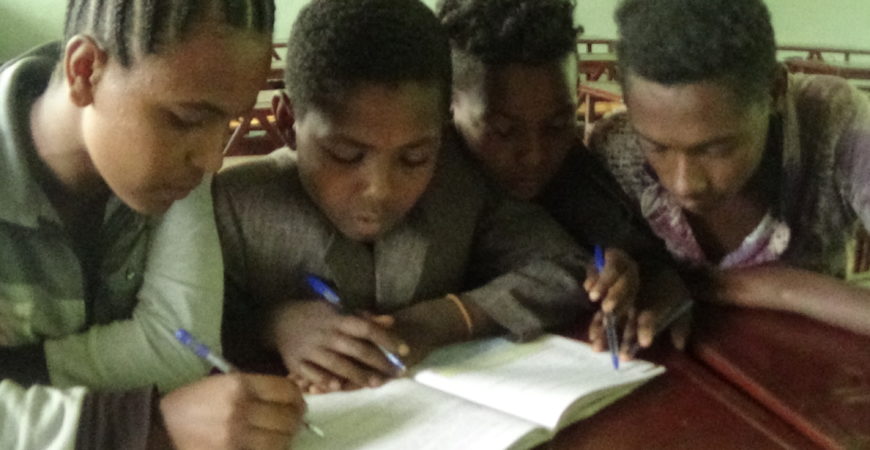Background: Gindabarat district is one of the 18 districts of West Shewa Zone. Mukadima is one of the 33 villages in Gindabarat district from where four vulnerable students are selected for scholarship.
Problem statement: About 85% of the population in Gindabarat district lives in rural areas and they are economically dependent on subsistence farming. Many families don’t afford to send their children to schools. As a pilot project, the Punya Foundation in collaboration with the School Management Board of Mukadima decided to support education of four vulnerable children. This is an attempt to empower children through education and to provide relief to their patents and this project is on since 2015.
Objectives of the scholarship project
- To empower vulnerable children in Mukadima village in Ethiopia providing scholarships for primary school education
- To extend solidarity and to provide support and relief to poor families assisting them to educate their children
Methodology: Giving continuity to its scholarship program for poor and vulnerable students in Africa, the Punya Foundation established a partnership with the School Management Board of Mukadima. Following several rounds of telephone conference with Mr. Moti Muleta, Zone TB/HIV mentor and focal person from Zonal Health Department, the Foundation decided to provide scholarships to 4 vulnerable students from a remote village of Mukadima. During the meetings, the Foundation and the School Management Board of Mukadima agreed on the following selection criteria:
- Primary school student or student attending primary school in village of Mukadima
- Students identified as poor and vulnerable by the school management committee in recommendation of the office of women and children affairs, represented by its member.

Committee Members Monitoring Activity
The scholarship selection and implementation committee (SSIC)
- Moti Muleta from Zonal Health Department, Chairperson
- Abdisa Kebede Mukadima, School Director Secretory
- Beza Werk Giorgis, Women and Children Affairs Member
- Chaluma Walteji, School Management Board Member
- Girma Dinka, Elder from the community
- Melka Muleta, Gindeberet Hospital
- Tadesse Gemechu, Agriculture Expert
Selection methodology: The SSIC contacted the schools in village of Mukadima and suggested to start brainstorming on the identification of vulnerable children. The SSIC visited villages, sought recommendations from the school management committee and from the member of Women and Children Affairs. Following this, opinion was sought from the Elder of the community. The SSIC then did home visits, school visit and interviewed students and their guardians. Keeping with the financial limitations, the SSIC selected four students with following specifications:
- 2 orphans with poor economic conditions of their guardians
- A child with a disabled mother (amputated leg). Mother makes her living through begging.
- A child whose guardians make hand to mouth living through chopping firewood and selling in the nearby market.

The scholarship selection and implementation committee (SSIC) on field visit to Mukedima
Project Implementation: The SSIC did a need assessment and developed an operational plan. The SSIC visited the villages, interviewed students and their guardians. Following this, the SSIC on leadership of Mr Muleta planned for award of scholarship in the form of school fees, necessary stationaries, school uniform and shoes. The SSIC, in collaboration with the school director distributed school uniforms stationeries and basic school necessities to the students. During the scholarship award session, the SSIC engaged stakeholders for monitoring and evaluation of the scholarship program.
Monitoring: Following methodologies have been used for the monitoring purpose
- Interviewed students and their guardians.
- Continuous follow up regarding the utilization of items distributed for intended plan and checking school attendance status.
- Regular meetings with formed committee
- Grade report document analysis
Evaluation
- Grade report review
- Feed back for the children’s and their guardians
- Assess the students school promotion annually and discuss with the school administration

Children with their Family
Challenges
- Difficult geographical terrain and lack of means of transport
- Huge need and limited budget
- Difficulty to select vulnerable children from poor community when majority live poverty laden life
Opportunities
- Gratefulness and acceptance of the external support wholeheartedly by the community
- Involved, supportive and engaged school management committee
- Volunteers willing to contribute time and giving 5 years to commitment to select students, implement and monitor and evaluate scholarship program

